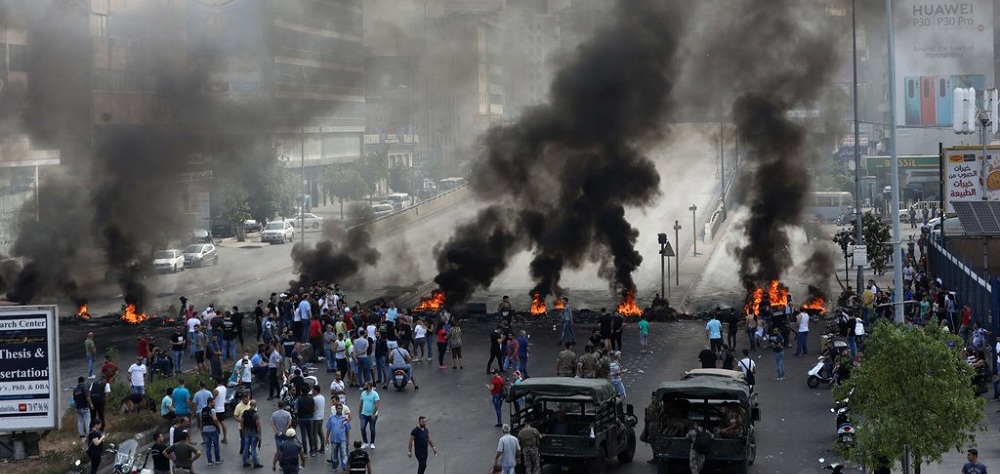Alwaght- As the fear of the coronavirus outbreak eases worldwide, the Lebanese protestors find the situation proper to return to the streets in a new wave of demonstrations and protest the bad economic conditions.
On Saturday, thousands of protestors took to the streets of the capital Baghdad voicing their anger with the deteriorating economic situation. What started as peaceful demonstration very soon turned violent and took the security forces intervention as some sectarian and divisive slogans were raised by some protestors. As a result of the clashes, 48 demonstrators were injured, the country’s Red Cross has said.
The economic conditions still critical
Clearly, Lebanon is currently seeing its worst financial times since its independence. Even during the civil war, 1975-1990, the people of Lebanon did not feel such economic hardship and crisis. The country suffers from high unemployment rates, recession, and huge foreign debts.
Although there are no reliable data to check the unemployment rates in the country, in 2018 president Michel Aoun said that unemployment was 46 percent in the country. This high rate is caused, in addition to the bad economic conditions, by the fluxes of the Syrian refugees that fled their country since 2012 because of war.
According to the International Monetary Fund, from 1993 to 2018, the Lebanese public debts surged to $84 billion from $4.4 billion. Predictions suggest that by 2024 the national debt will increase to 185 percent of the GDP. Currently, Lebanon’s debt interest payment is as much as 9 percent of its GDP.
The national currency, pound, has lost over 50 percent of its value against the US dollar, triggering price hikes.
The annual inflation rate in February was 36.11 percent, the highest since December 2008. The food prices have risen fast recently, moving up to 19.76 percent from 14.45 in January. The tobacco prices rose 36.60 percent compared to 33.39 percent in January. The apparel prices surged 92.30 percent. The housing, facilities, and transportation sectors saw decreasing inflation rates, reports suggest.
In the middle of the economic downturn, the outbreak of the coronavirus has been an additional factor helping the deterioration. Lebanon has a service-based economy, with the two sectors of banking and tourism being the two vital poles of the economy. As the airports were closed down in the Persian Gulf Arab countries, which are the origin for the biggest number of travels to Lebanon, as a result of the pandemic, the number of the travelers to and from Lebanon dropped by 53 percent, meaning Lebanon will lose 1.2 million tourists by end of the tourism season summer if the coronavirus crisis lingers.
Also, the terrorism war against Syria that began in 2012 left undeniable negative impacts on the Lebanese economy. It influenced the country’s security, hence forcing down the direct foreign investment and tourist arrivals in the country.
Foreign and home opponents unite against Prime Minister Hassan Diab
After the former government led by Saad Hariri resigned to escape giving an explanation to protestors about the financial crisis and put pressure on the Hezbollah-aligned March 8 Alliance to wrest from it the upper hand in the parliament, Hassam Diab was named in January new PM with the support of Hezbollah and its allies.
Immediately after assuming the position, he said that he will soon unveil his economic reforms. The reforms will complete in a 5-year timeframe, according to him.
He promised that the reforms will target reducing the country’s budget deficit to less than, restructuring the public debt and reducing them to less than 100 percent of the GDP, and reforming the financial and banking sectors to create new job opportunities and fight corruption.
But the PM’s reforms will be hampered by financial sources shortage. At the same time, he faces the treachery of home and foreign opponents who seek to fail his cabinet.
To run his reforms, Diab plans to apply for $10 billion in aids from the IMF. He also makes efforts to receive the aids the participators in the Paris summit to help Lebanon out of the crisis promised earlier this year. In fact, he counts on foreign financial support for restoring the struggling Lebanese economy.
But reaching these foreign aids is becoming tougher as foreign intervention continues. Failed to bring to its knees the Lebanese Hezbollah on the ground, the US, along with Saudi Arabia and the Israeli regime, push with its plans to destabilize Lebanon and weaken the central government by fueling the economic crisis in Lebanon to create chaos and undermine the Lebanese resistant movement.
To this end, the US imposed sanctions on different economic sectors in Lebanon. In addition, Washington meddles in the job of the IMF to block entry to Lebanon of foreign currencies which help strengthen the country’s monetary basis. Also, there are reports that the US government froze the Lebanese gold reserves in New York, something bearing direct impacts on the country’s currency value.
Chanting sectarian slogans to fuel secto-religious chaos and unrest in Lebanon, which enjoys massive secto-religious diversity, indicates that the foreign conspiracy will enter a new stage in the days and weeks to come. From now, the Lebanese officials began to understand the plot and warn the people against it.
“Any voice that fuels division and sedition in the county and among the followers of a single faith is in fact a “Hebrew” voice even if it sounds Arabic. Anybody who awakens the sedition is damned,” Lebanese Parliament Speaker Nabih Berri said, referring to the Israeli plans to create chaos in the country by exploiting the popular protests.
Also, President Michel Aoun called for ending the efforts to trigger religious sedition, adding that offensive to symbols of any group or faith is offensive to the whole Lebanon.
Hezbollah was also among those condemning the insulting slogans by some protestors, stating that it stands against any attempts to create division, sedition, and religious and sectarian tensions.



























